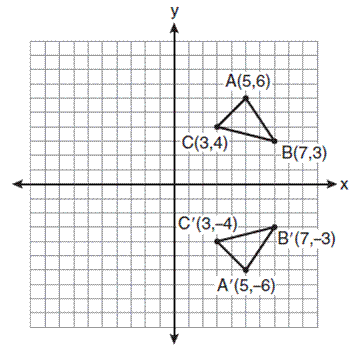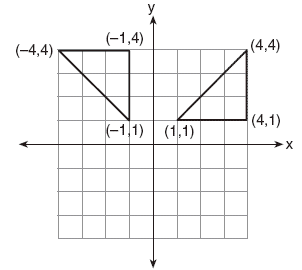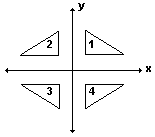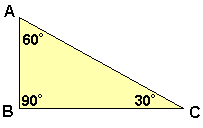State the 3 rigid transformations discussed in class.
Translation
Reflection
Rotation
What is the rule for Rotations?
a) 90 degrees clockwise
b) 90 degrees counterclockwise
c) 180 degrees clockwise/counterclockwise
*all around the origin
a) 90 degrees clockwise
(x,y) ---> (y,-x)
b) 90 degrees counterclockwise
(x,y) ---> (-y,x)
c) 180 degrees clockwise/counterclockwise
(x,y) ---> (-x,-y)
What are the rules for reflections?
a) x-axis
b) y-axis
a) x-axis
(x,y) ---> (x,-y)
b) y-axis
(x,y) ---> (-x,y)
What is the definition of congruent?
Congruent:
-same size and shape
-corresponding sides and angles have the same measure
What are the 2 components needed when describing a rigid transformation?
a) State the rigid transformation
b) State the details
Ex:
a) Translation
b) 5 units to the right
Draw an example of:
a) translation
b)reflection
c)rotation
answers will vary
Point (-6, 7) is rotated 180° about the origin in a counterclockwise direction. What are the coordinates of its image?
(6,-7)
What are the coordinates of A', the image of A(12, 7) after a reflection in the x-axis?
A' (12,-7)
Draw an example of 2 figures that are congruent.
Answers will vary
Which expression best describes the transformation shown in the diagram below?

Reflection across the x-axis
What are the "movements" of the rigid transformations?
a) Translation -
b) Reflection -
c) Rotation -
a) Translation - SLIDE
b) Reflection - FLIP
c) Rotation - TURN
Leah rotates △ABC 180 degrees counterclockwise around the origin to form △A'B'C'.
A (2,3) , B (5,8), C (9,2)
What are the coordinates of the vertices of △A'B'C'?
A' ( , ), B' ( , ), C' ( , )
A' ( -2 , -3 )
B' ( -5 , -8 )
C' ( -9 , -2 )
What are the coordinates of A' and B', the image of A(-1, -5) and B (-4,-9) after a reflection in the y-axis?
A' (1,-5)
B' (4, -9)
If ΔGHI  ΔJKL, then ∠L is congruent to which angle?
ΔJKL, then ∠L is congruent to which angle?
∠I
Describe the rigid transformation that occurred.

Translation 7 units to the right
Which is a 180° rotation of the figure  ?
?
C.

Blake rotates △ABC 90 degrees counterclockwise around the origin to form △A'B'C'.
A (-4,6) , B (-8,8), C (-3,1)
What are the coordinates of the vertices of △A'B'C'?
A' ( , ), B' ( , ), C' ( , )
A' ( -6 , -4 )
B' ( -8 , -8 )
C' ( -1 , -3 )
Bob reflects △ABC across the x-axis to form △A'B'C'.
A (1, 2) , B (5,9), C (2,4)
What are the coordinates of the vertices of △A'B'C'?
A' ( , ), B' ( , ), C' ( , )
A' ( 1 , -2 )
B' ( 5 , -9 )
C' ( 2 , -4 )
1) Are the following rectangles congruent?
2) Explain why.

The rectangles are NOT congruent.
The rectangles are not the same size and one pair of corresponding side lengths are not the same measure.
Which type of transformation is illustrated in the accompanying diagram?

Rotation 90 degrees clockwise around the origin
In the diagram, which triangle is the image of Δ2 after a reflection in the x-axis?

Triangle 3
Emma rotates △ABC 90 degrees clockwise around the origin to form △A'B'C'.
A (-3,-6) , B (-1,-4), C (-5,-7)
What are the coordinates of the vertices of △A'B'C'?
A' ( , ), B' ( , ), C' ( , )
A' ( -6 , 3 )
B' ( -4 , 1 )
C' ( -7 , 5 )
Kayla reflects △ABC across the y-axis to form △A'B'C'.
A (5, 2) , B (8,1), C (4,7)
What are the coordinates of the vertices of △A'B'C'?
A' ( , ), B' ( , ), C' ( , )
A' ( -5 , 2)
B' ( -8 , 1 )
C' ( -4 , 7 )
The angle measurements of triangle ABC are shown below:

If triangle DEF is congruent to triangle ABC, what is the measure of angle E?
90°
Which type of transformation is illustrated in the accompanying diagram?
Rotation 90 degrees counterclockwise around the origin


